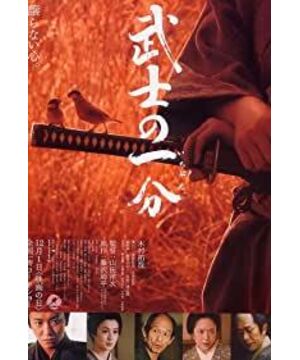Yamada Yoji's "Samurai Trilogy" focuses on the lower-level samurai at the end of the shogunate, far from the backcountry of Kyoto, and is also affected by the turmoil of the times, and everything is quietly changing. Some sad and solemn stories happened. The status of a samurai does not bring much benefit to the protagonist. He is at the bottom of the strict hierarchy, and takes loyalty and obedience as his duty, and his fate is not much in his own hands. However, they still have deep love, faith, and swords in their hands, and finally won a point for themselves as samurai. (One point, Japanese "dignity")
I read the trilogy backwards. The first thing I watched, "Samurai's Point", was mainly attracted by the poster: the samurai stood with his sword, and two birds stood leisurely on the handle of the sword. Atmospheric beauty. Reminds me of the famous haiku: "The samurai stands and listens to the singing of Ying'er." The village samurai Ouji Wengo, guided by a good teacher several times, sings such a sentence full of kindness and poetry - harmonizing the violence of martial arts, restraining the indulgence of martial arts, and letting go The sword of the samurai obeys the higher morality, obeys the beauty.
Takuya Kimura plays a low-ranking villager, Sancun Xinzhicheng. He has a meager salary and is conscientiously doing a job of testing poison for the lord before meals. Unfortunately, he is poisoned and will be thrown away like garbage. Although the situation is unreasonable, for samurai, this is their irresistible vocation. Sancun's ideal is to find an opportunity to quit this job and open a dojo with his wife in the countryside to teach the children swordsmanship. I have n't had time yet....
Kimura Takuya is still too handsome. No matter how he looked at it at first, he felt that he was not in harmony with the environment, so Wenxiu had a bit of extravagance, and it was a bit like the exiled source of light. He also looked uncomfortable. After the blindness, the performance is much better.
In any case, the spirit of the samurai declined, and in confusion some samurai began to find their own way. In "One Point of the Samurai", Mimura is tired of the so-called vocation, and after blindness, he struggles to regain his dignity and avenge his cheated wife; Lord Qingbingwei, because he devoted himself to taking care of his wife and children, he had no time to wash up, and appeared in front of the lord like a stinky salted fish. Lost... Samurai who go on different paths follow their own hearts and may stand on the opposite side, but they are all worthy of the title of samurai, and they can be regarded as real men, is it strange? Such a strange time. The political gives way to the moral, and then to the human.
Kiyobei, who hurried home in the twilight of the twilight, is a good man of Cancer no matter how you look at it. She loves and protects her family like an old hen, she is as quiet and taciturn as a fool, she smiles honestly and warmly, she just gives in when things go wrong, she doesn't look aggressive or bullying at all, once she really makes up her mind, she cannot be shaken...but , Sanada Hiroyuki is Libra, a sleek constellation.
After all, he is an old director who has filmed the series "The Call of the Distant Mountain", "The Yellow Handkerchief of Happiness", and "Tan Jiro". Love and hate, contradictions and conflicts, are restored to a porridge and a meal, and they are wiped out. The use of a very traditional lens shows the beauty of silence and harmony. It seems that watching the flow of a river in Akihara may be a bit boring, but I can't find any flaws.
View more about Love and Honor reviews










